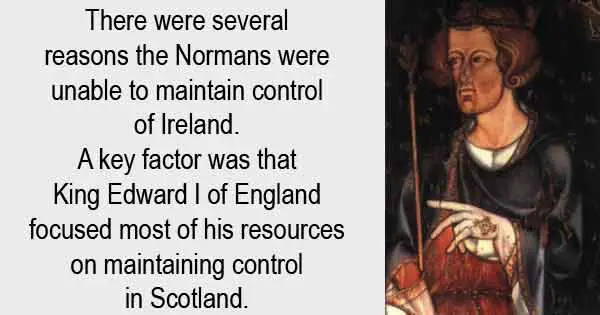During the 14th century, the Normans in Ireland became victims of outside circumstances as Europe went from one disaster to another. These outside forces combined to severely weaken their power and influence.
the_Normans_in_text.html
At home, the Normans were under pressure from Irish kings and chieftains who had learned to change tactics in battle. Knowing that the armoured Norman Knights were a formidable force, the Gaelic forces often sprang surprise raids in Norman territories. They would take resources and weapons which could then be used against the Normans, weakening their power.
English kings were focused on Scotland, not Ireland
The Normans were also receiving far less support from England, where King Edward I was having to use all his resources to consolidate and maintain his power base. He had his work cut out keeping the Welsh onside also had interests on the continent. However, his greatest achievement was capturing Scotland. Scotland, unlike Ireland, was a country with a stable and united royal line.

With everybody in Scotland fighting for the same king,the country was far more difficult to conquer than Ireland. Edward still managed to do so but it soaked up most of his resources so was unable to send much financial support to the Irish Normans as a result. Not only that, but Edward also needed to take troops out of Ireland in order to maintain his stance against the Scots.
As the generations passed the Norman estates split into smaller territories as they passed from one generation to numerous heirs in the next generation. This left each successive lord with a weaker base than his father’s. They compensated by forming alliances with the Gaelic chiefs in a bid to maintain power, but this was not always successful.
The Normans were further weakened when King Edward II took the English throne. His father’s achievement was always going to be difficult to maintain as the Scots would seek to regain their independence. Edward II was unable to maintain control over Scotland and his army lost to Robert Bruce’s forces at Bannockburn in 1314.
European famine hurt the Normans
The Normans were then hit by a natural disaster. Much of Europe fell victim to famine as crops failed from 1315-18 due to a climate change which saw the winters become colder and wetter. Europe had seen a considerable rise in population during a period of economic expansion. When the crops failed there wasn’t enough food to supply the ever increasing demand.
Ireland wasn’t immune to the famine. It was unable to import crops as there were no surplus supplies. This made life particularly difficult for the Normans as they were largely concentrated in port towns and were largely reliant on imports. They were less able than the rural Irish to grow their own crops.
The situation was made worse by Edward Bruce, who was on a mission to conquer Ireland during those same years. Edward’s forces burned many of the crops that the Normans would have used for themselves.
Even after the famine had ended, many people in Europe were significantly undernourished due to the shortage of food. It meant that they were more vulnerable to disease – and a significant plague was about to sweep through Europe.
The campaign of Edward Bruce, while ultimately unsuccessful, severely weakened the Normans. More on Edward Bruce
Mormans weakened by bubonic plague
One of the most significant events of the century was the bubonic plague. The plague was also known as the Black Death and some sources say it killed a quarter of the population of Europe – up to 25 million people.
It arrived in Europe in 1347, most likely from China and central Asia. It was carried along the trade routes by rats and was transmitted to humans. Such was the efficiency of international trade across Europe by this time that the plague took just one year to travel from the east to the very west of Europe, arriving in Ireland in 1348.
As trade centres, it was the towns rather than the country side that were the most badly affected by the plague. As the Normans controlled the towns it was they who were seriously depleted as a result of the disease. Scholars believe that a third of the Irish population died.
Normans still ruled the Pale
Following the plague, the areas of Ireland under Norman control were reduced significantly. The only place still under the control of the English crown was known as the Pale, and consisted of Dublin and the surrounding area.
Outside the Pale, the Norman lords began to speak Gaelic and took on Irish customs. They became integrated with the Irish just as the Vikings had done hundreds of years earlier. They were said to have become ‘More Irish than the Irish themselves’.
The phrase ‘Beyond the Pale’ comes from this period. It was originally an English expression that referred to the rest of Ireland outside the Pale, which wasn’t under English rule. The English believed themselves to be far more civilised than the Irish which is why the term ‘beyond the pale’ has come to mean uncivilised or even despicable.
the_Normans.html
